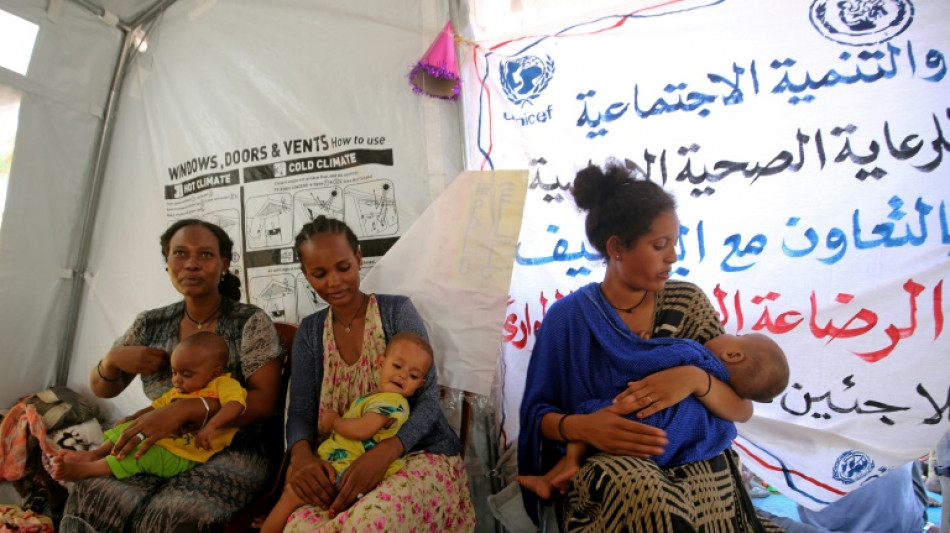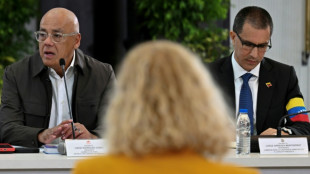
-
 NFL names 49ers to face Rams in Aussie regular-season debut
NFL names 49ers to face Rams in Aussie regular-season debut
-
Bielle-Biarrey sparkles as rampant France beat Ireland in Six Nations

-
 Flame arrives in Milan for Winter Olympics ceremony
Flame arrives in Milan for Winter Olympics ceremony
-
Olympic big air champion Su survives scare

-
 89 kidnapped Nigerian Christians released
89 kidnapped Nigerian Christians released
-
Cuba willing to talk to US, 'without pressure'

-
 Famine spreading in Sudan's Darfur, UN-backed experts warn
Famine spreading in Sudan's Darfur, UN-backed experts warn
-
2026 Winter Olympics flame arrives in Milan

-
 Congo-Brazzaville's veteran president declares re-election run
Congo-Brazzaville's veteran president declares re-election run
-
Olympic snowboard star Chloe Kim proud to represent 'diverse' USA

-
 Iran filmmaker Panahi fears Iranians' interests will be 'sacrificed' in US talks
Iran filmmaker Panahi fears Iranians' interests will be 'sacrificed' in US talks
-
Leicester at risk of relegation after six-point deduction

-
 Deadly storm sparks floods in Spain, raises calls to postpone Portugal vote
Deadly storm sparks floods in Spain, raises calls to postpone Portugal vote
-
Trump urges new nuclear treaty after Russia agreement ends

-
 'Burned in their houses': Nigerians recount horror of massacre
'Burned in their houses': Nigerians recount horror of massacre
-
Carney scraps Canada EV sales mandate, affirms auto sector's future is electric

-
 Emotional reunions, dashed hopes as Ukraine soldiers released
Emotional reunions, dashed hopes as Ukraine soldiers released
-
Bad Bunny promises to bring Puerto Rican culture to Super Bowl

-
 Venezuela amnesty bill excludes gross rights abuses under Chavez, Maduro
Venezuela amnesty bill excludes gross rights abuses under Chavez, Maduro
-
Lower pollution during Covid boosted methane: study

-
 Doping chiefs vow to look into Olympic ski jumping 'penis injection' claims
Doping chiefs vow to look into Olympic ski jumping 'penis injection' claims
-
England's Feyi-Waboso in injury scare ahead of Six Nations opener

-
 EU defends Spain after Telegram founder criticism
EU defends Spain after Telegram founder criticism
-
Novo Nordisk vows legal action to protect Wegovy pill

-
 Swiss rivalry is fun -- until Games start, says Odermatt
Swiss rivalry is fun -- until Games start, says Odermatt
-
Canadian snowboarder McMorris eyes slopestyle after crash at Olympics

-
 Deadly storm sparks floods in Spain, disrupts Portugal vote
Deadly storm sparks floods in Spain, disrupts Portugal vote
-
Ukrainian flag bearer proud to show his country is still standing

-
 Carney scraps Canada EV sales mandate
Carney scraps Canada EV sales mandate
-
Morocco says evacuated 140,000 people due to severe weather

-
 Spurs boss Frank says Romero outburst 'dealt with internally'
Spurs boss Frank says Romero outburst 'dealt with internally'
-
Giannis suitors make deals as NBA trade deadline nears

-
 Carrick stresses significance of Munich air disaster to Man Utd history
Carrick stresses significance of Munich air disaster to Man Utd history
-
Record January window for transfers despite drop in spending

-
 'Burned inside their houses': Nigerians recount horror of massacre
'Burned inside their houses': Nigerians recount horror of massacre
-
Iran, US prepare for Oman talks after deadly protest crackdown

-
 Winter Olympics opening ceremony nears as virus disrupts ice hockey
Winter Olympics opening ceremony nears as virus disrupts ice hockey
-
Mining giant Rio Tinto abandons Glencore merger bid

-
 Davos forum opens probe into CEO Brende's Epstein links
Davos forum opens probe into CEO Brende's Epstein links
-
ECB warns of stronger euro impact, holds rates

-
 Famine spreading in Sudan's Darfur, warn UN-backed experts
Famine spreading in Sudan's Darfur, warn UN-backed experts
-
Lights back on in eastern Cuba after widespread blackout

-
 Russia, US agree to resume military contacts at Ukraine talks
Russia, US agree to resume military contacts at Ukraine talks
-
Greece aims to cut queues at ancient sites with new portal

-
 No time frame to get Palmer in 'perfect' shape - Rosenior
No time frame to get Palmer in 'perfect' shape - Rosenior
-
Stocks fall as tech valuation fears stoke volatility

-
 US Olympic body backs LA28 leadership amid Wasserman scandal
US Olympic body backs LA28 leadership amid Wasserman scandal
-
Gnabry extends Bayern Munich deal until 2028

-
 England captain Stokes suffers facial injury after being hit by ball
England captain Stokes suffers facial injury after being hit by ball
-
Italy captain Lamaro amongst trio set for 50th caps against Scotland


One woman dies every 2 mins in pregnancy, childbirth: UN
A woman dies every two minutes due to pregnancy or childbirth complications, despite maternal mortality rates dropping by a third in 20 years, the United Nations said Thursday.
Rates fell significantly between 2000 and 2015 but largely stagnated between 2016 and 2020 -- and in some regions have even reversed, the UN said.
The overall maternal mortality rate dropped by 34.3 percent over a 20-year period -- from 339 maternal deaths per 100,000 live births in 2000 to 223 maternal deaths in 2020, according to a report by the World Health Organization and other UN agencies.
Nonetheless, that means nearly 800 women died per day in 2020 -- or around one every two minutes.
Belarus recorded the biggest decline -- down 95.5 percent -- while Venezuela saw the highest increase. Between 2000 and 2015, the biggest rise was in the United States.
"While pregnancy should be a time of immense hope and a positive experience for all women, it is tragically still a shockingly dangerous experience for millions around the world," said WHO chief Tedros Adhanom Ghebreyesus.
"These new statistics reveal the urgent need to ensure every woman and girl has access to critical health services... and that they can fully exercise their reproductive rights."
The report found that between 2016 and 2020, maternal mortality rates dropped in only two of the eight UN regions: in Australia and New Zealand by 35 percent, and in Central and Southern Asia by 16 percent.
- 'Unconscionable' -
The rate went up in Europe and Northern America by 17 percent, and in Latin America and the Caribbean by 15 percent. Elsewhere, it stagnated.
The two European countries witnessing "significant increases" are Greece and Cyprus, the report's author Jenny Cresswell told journalists.
Maternal deaths remain largely concentrated in the world's poorest regions and in conflict-affected countries.
Around 70 percent of those deaths recorded in 2020 were in sub-Saharan Africa, where the rate is "136 times bigger" than in Australia and New Zealand, Cresswell said.
In Afghanistan, the Central African Republic, Chad, the Democratic Republic of Congo, Somalia, South Sudan, Sudan, Syria and Yemen -- all facing severe humanitarian crises -- rates were more than twice the global average.
Severe bleeding, infections, complications from unsafe abortions and underlying conditions such as HIV/AIDS are among the leading causes of death, the report said -- which are all largely preventable and treatable.
The WHO said it was "critical" that women had control over their reproductive health -- particularly about if and when to have children, so that they can plan and space childbearing to protect their health.
Natalia Kanem, head of the UN Population Fund, said the rate of women "needlessly" dying was "unconscionable".
"We can and must do better by urgently investing in family planning and filling the global shortage of 900,000 midwives," she said.
While the report covers data up to 2020, the WHO's Anshu Banerjee told journalists that the statistics since then look bleak, due to the Covid-19 pandemic and the economic crisis.
U.AlSharif--SF-PST



